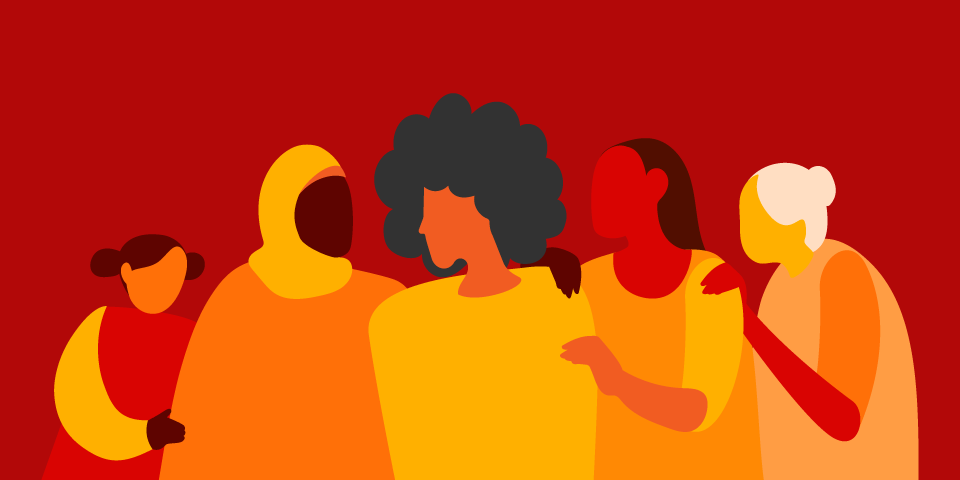Sexual harassment awareness month marked in April 2021. How to recognize this phenomenon
In the Republic of Moldova, sexual violence remains a sensitive topic that needs more visibility. According to statistics, in 2011, 63% of girls and women had been subjected to (psychological, physical or sexual) violence from husband/partner. This phenomenon affected their lives from the age of 15.Date:

Developing and launching informative campaigns aiming at ensuring that each person is aware of how abusive behaviours manifest themselves and how to report them, represent an important step towards preventing this phenomenon. At the same time, it is an important step towards learning how to behave in case we become survivors or witnesses of such abusive situations.
As Sexual Awareness Month is marked worldwide annually in April, this year, we reiterate the necessity of recognizing abusive behaviours. Also, it is important to understand the collective responsibility we share in encouraging survivors to report such cases. It is to be mentioned that we cannot tolerate the systemic culture promoting an unfair attitude towards affected people.

So, what is sexual violence and how do we recognize it?
World Health Organization (WHO) defines sexual violence as any sexual act, or any attempt to obtain unwanted sexual acts, where the abuser initiates advances, or sexual comments and coercion. This may repeat and may manifest itself by less violent attempts, which anyway affect survivors psychologically. An abuser can be any person from the survivor’s surroundings, in any context, including at a workplace, public spaces, educational institutions, entertainment places but also at home.
In the same definition, WHO highlights what does coercion mean and how can it be recognized, it may be:
- Applying different levels of force
- Psychological intimidation
- Extortion
- Threats (abusers may threaten that the victim will be injured, or will not be hired, etc.)
Nevertheless, we need to understand the complexity of sexual violence as it may also manifest itself in actions initially seen as inoffensive. For example, if the survivor had been abused by his or her intimate partner, it may be seen as something normal or may be identified as a duty in a relationship with a partner. At the same time, sexual violence between 2 partners is not limited to physical aspects only and may manifest itself psychologically. Abusers may also threaten that they will break up or post photos or videos with the partner in intimate hypostases, etc. Especially in our cyber reality. Awareness about the fact that sexual violence may take place online, regardless of the social status of the person, their income, surroundings, or nationality, is crucial in understanding abuse.
What can we do to help survivors?
We need to understand that people who have experienced or are experiencing sexual abuse may hide it because they may be afraid of stigmatization. Moreover, these people may live together with their abusers and may experience normalized psychological violence, without recognizing that they are in an abusive situation. In such cases, it is very important for us to study this phenomenon and to inform ourselves from different sources and studies about its peculiarities. Recognizing abusive behaviours, especially those subtle, represents a crucial step towards identifying and preventing their spreading.
At the same time, it is important to promote a culture where survivors would feel safe to speak up about their experiences, without being afraid of marginalization, or exclusion from the environment they belong to or blame for things that happened to them. It is important to recognize that sexual violence never happens because of the survivor, clothes she or he is wearing, his or her behaviour. Sexual violence is a result of many factors which intersect at cultural, community and social levels. That is why, combating this phenomenon is crucial from different points of view, and at different levels, especially health level, including mental health. The prioritization of these aspects is important, as well as focusing on prevention and normalizing open dialogues on how to recognize sexual abuse in our environment, and what is our common responsibility in monitoring abusive behaviours and their reporting.
According to the UN, violence against girls and women in many cases manifests itself as physical, sexual and psychological violence, they being subjected to gender-based violence systematically. This can be observed in discrimination in education and promoting a sexist culture. Thus, in April, we express our willingness to build a society where any person would feel safe and each woman and girl would be empowered to fight against discrimination and abuse they are subjected to. At the same time, through the EVA project "Promoting gender equality in Cahul and Ungheni districts", funded by the European Union and implemented by UN Women in partnership with UNICEF, we encourage the development of a specialized service for victims of sexual violence, which will unite all the support and assistance needed by survivors of sexual violence. Consequently, we continue to support the development of special tools and the distribution of information and awareness materials for decision makers, which are organized and developed in collaboration with the International Center "La Strada". Through them, doctors, psychologists and managers of health centers and youth-friendly centers in Ungheni and Cahul districts participated in seminars designed to improve the response of health and social systems to cases of sexual violence. Also, more than 20 officers, prosecutors and representatives of the management of police inspectorates were guided and received information on the principles of investment focused on the needs of survivors of sexual violence.
For more details about this phenomenon, visit: International Center "La Strada Moldova", Women's Law Center, UN Women Moldova.Report cases of violence to 112 or the Hotline destined for helping women and girls who are struggling with violent situations: 0 8008 8008